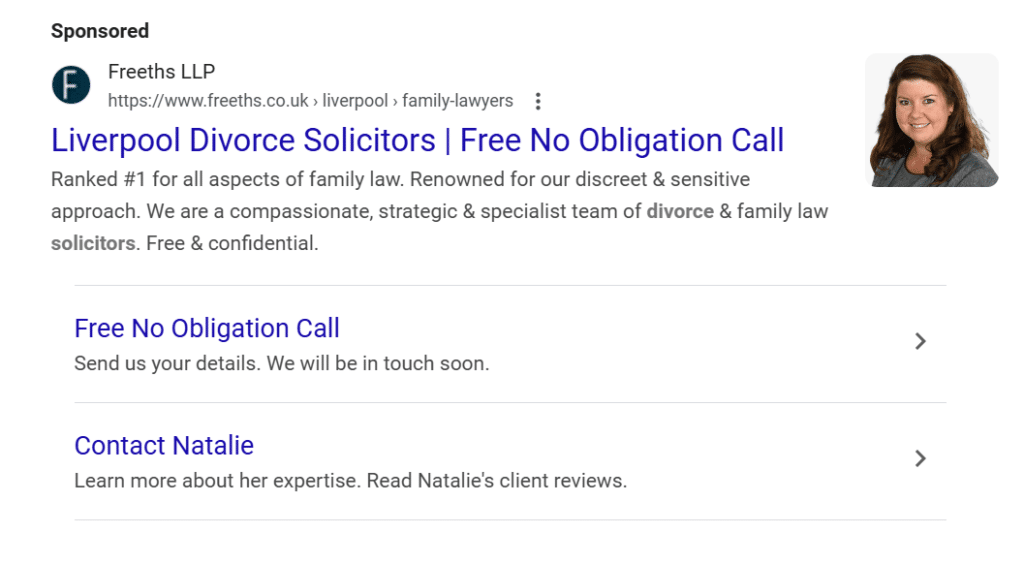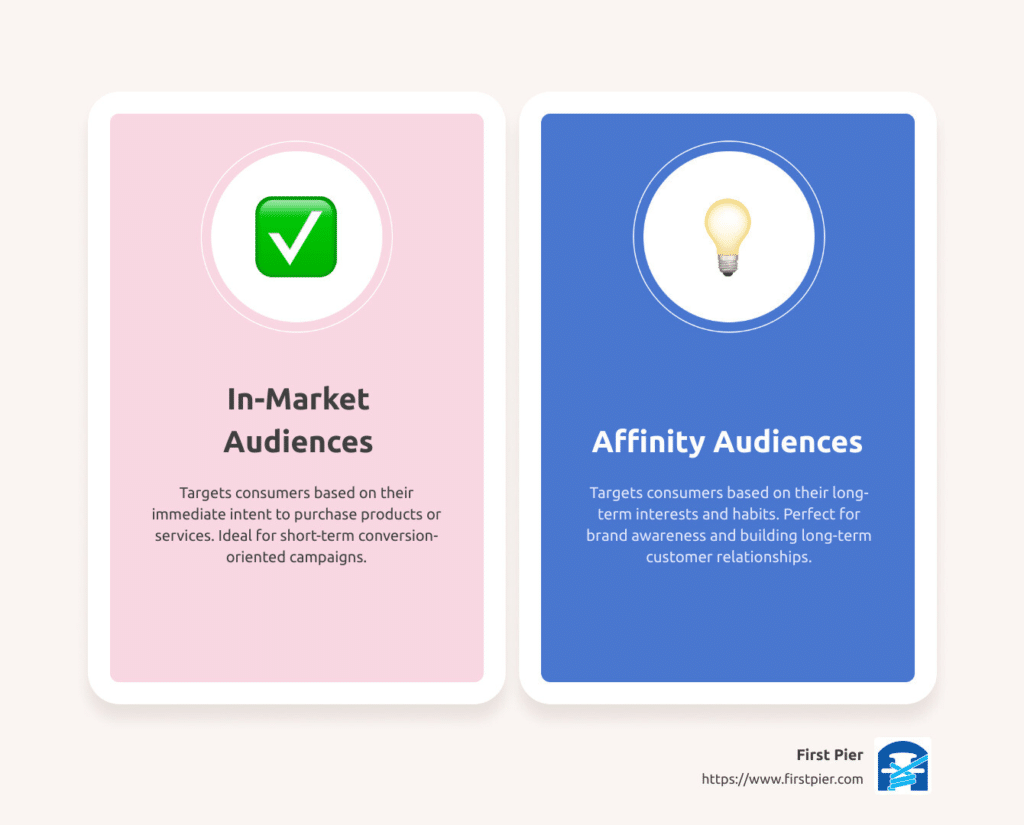Google Ads for Family Lawyers [Featuring Anonymised Data]

Last Updated on: 24th November 2025, 12:46 pm
When people need a family lawyer, they need them urgently. Unlike other legal fields like corporate law, most family law clients are making emotional, high-stakes decisions that can’t wait.
Google Ads puts your law firm in front of people searching for legal help when they need it most. We’re working with some amazing US based lawyers and in this article we are going to be pulling back the curtain – revealing the strategies we used to build and manage their successful Google ads campaigns.
We will also be giving you an inside look at 90 day’s data from 2025 so you understand what family lawyers can expect to pay for their leads from Google ads – whether that’s for child custody, adoption, divorce, prenups and many more.
For the best results with Google ads campaigns for family lawyers, your advertising strategy has to avoid the “curiosity clicks” and focus on ideal clients. Come with me as I show you how to bring in the family law cases you’ll want to represent!
First: How Much Should Family Lawyers Expect To Pay for Google Ads?
Before spending money on Google Ads, you need to know how much to allocate, particularly if you’re already investing in other marketing strategies.
Let’s start by revealing the 90 day sample size of Google Ads data from 2 successful family lawyers.
Keep in mind that the purpose behind showing you this is not to say “this is exactly what you will pay for your Google ads as a family lawyer” – that will depend on your particular location and competition level.
There are also other variables, such as the landing page or website you are driving the traffic to. This will alter your cost per lead.
We are revealing this to give you a bird’s-eye view of the numbers behind successful Google Ads campaigns. Then you have a rough idea of what you need to aim for; as well as an understanding of how many keywords and ad groups need to be set up for success. It’s a lot of work! There is nothing else on the internet like this that goes as detailed and specific for family lawyers using real data from 2025! (We’ve checked!)
Ready to take a look? Let’s jump in.
Family Lawyer Case Study 1
So, for our first example, we initially created 285 ad groups containing 3214 different keywords. Many of these keywords and ad groups were later paused as we analysed the data and identified the lower performers. Data from January 2025 until March 31st 2025 shows:
- $49.88 on average for each lead.
- $10.24 on average for each click.
- 20.52% on average for conversion rate.
Let’s get even more specific. Here’s a breakdown of the cost per lead for particular keywords:
- Child custody – $49.13 – $60.95
- Family law – $37.91 – $61.63
- Restraining order – $46.42
- Protective order – $36.60
- Adoption – $33.31
- Family attorney – $29.93
- Lawyer for prenups – $54.05
- Joint child custody lawyer – $35.65
- Divorce lawyer – $38.12
- Parental rights – $99.29
Let’s move on to the second example now. You’ll see how much the costs can change for different keywords and locations. Keep in mind that we’ve been managing these ads for a couple of years now for both family lawyers. So these examples can help you see how much the costs can change, yet still be successful overall.
Family Lawyer Case Study 2
For our second example, we created 175 ad groups containing 1061 different keywords. Again, many of these keywords and ad groups were later paused as we analysed the data and identified the lower performers. Data from January 2025 until March 31st 2025 shows:
- $34.14 on average for each lead.
- $4.93 on average for each click.
- 18.08% on average for conversion rate.
Time to get even more specific. Here’s a breakdown of the cost per lead for particular keywords:
- Custody lawyer – $50.67 – $87.02
- Family law attorney – $22.69
- Fathers rights attorney – $93.14
- Child custody attorney/lawyer – $50 – $51.76
- Divorce lawyer – $69.75
- Divorce attorney – $34.49
- Family custody attorney – $32.88
- Men’s divorce attorney – $63.47
Remember, your own budget will depend on:
- CPCs for family law keywords
- The competition in your area
- Your case value
My advice? Look at how much you’re currently spending to acquire clients through different channels. Then calculate a reasonable acquisition cost for your ideal clients, which should give you an excellent budget baseline.
Keep in mind that, if you run a successful campaign independently or with the help of an experienced Google Ads agency, it’s normal to see conversion costs increase. In the case of my family law clients, they get more qualified leads (as we’ve stopped the leads who will never convert into paying clients from clicking on their ads).
You can also review my full guide on how to budget for Google Ads.

Why You Should Have Separate Campaigns and Ad Groups (with Google Ads Examples for Family Lawyers)
Someone looking for a divorce lawyer isn’t the same as someone seeking prenuptial agreement services, and your campaigns should reflect that. This gives you better control over spend, keywords, and ad messaging.
Within each campaign, you can get even more granular. After all, a contested divorce requires a different approach than an amicable separation. A parent seeking full custody isn’t looking for mediation.
Breaking these down into separate ad groups helps you personalise your copy and keywords for better results.
Example: How Unstructured Campaigns Can Dilute Your Message
Take a look at the following ad:

It includes sitelink assets, a strong CTA in the headline, and a professional image extension for added credibility.
But here’s the issue…
This ad showed up for both the following terms: “divorce lawyer near Manchester” and “prenup lawyer near Manchester.” Yet the copy focuses on divorce and family law in general.
That suggests the campaign might be too broad, possibly lumping divorce and prenups into the same ad group or running on a broad match keyword like “family lawyer” that’s triggering both.
If I were looking for financial protection before marriage, I’d want copy that reassures me this firm specialises in prenups.
Now look at the next one.

This ad wins for fast prenup searchers.
There’s no vague “all aspects of family law” here, just a clear solution for a specific audience with a compelling reason to act now. And nothing says value like “less than 45 days” (when the typical prenup takes 2-3 months).
What You Target vs. What Clients Actually Search For
There’s a big difference between what you assume people search for and what they type into Google.
You might expect every potential client to search for “family lawyer near me”, but many are searching with intent-revealing queries like:
- “How to get full custody of my child”
- “Divorce lawyer for women”
- “Can I get divorced without a lawyer?” (potential DIYer, and probably not your ideal client)
The beautiful thing about Google Ads is that it’s a balancing game – you can add and remove certain terms, narrow them down and expand them until they meet your ideal target audience. Here’s how to do it:
Negative Keywords: Protect Your Budget from Irrelevant Clicks!
If you don’t add negative keywords, Google may show your ads to irrelevant searches such as:
- “Free divorce lawyer” – If you don’t offer pro bono services, this is a waste of money.
- “Law school family law courses” – You don’t want students clicking on your ads.
- We’ve even seen some cases where Google, left on its own, served family lawyer ads to people looking for criminal defence attorneys!
That’s why you should regularly review your search terms report to see what people are actually searching for when they click your ad. If you spot irrelevant terms, add them to your negative keyword list to tighten targeting and protect your budget.
Match Types: Why They Matter When It Comes to Google Ads for Family Lawyers
The keyword match types you choose determine how strict or flexible Google is when deciding which searches will trigger your ad:
- Broad match is Google’s default setting. Your ad doesn’t just show up for your keyword, but for any remotely related searches, even if the actual words aren’t in the query.
For example, if you’re targeting “child custody lawyer”, your ad could show up for searches like “family law attorney free consultation”. If you’re using broad match, control it by using a robust negative keyword list.
- Phrase match means your keyword has to appear in order within the search, though Google may add related variations. If you’re targeting “divorce lawyer for women”, your ad could show for “best divorce lawyer for women in (city)”. Be sure to use the right phrase match modifiers and negative keywords.
- Exact match gives you extreme control. Your ad only shows when someone searches for your exact keyword (or a close variant). For example, targeting “divorce lawyer for men” means that your ad appears only for searches like “divorce lawyer for men” or “divorce attorney for men”. It wouldn’t show up for a query like “best family lawyer”, though.
If you want a deeper dive, I break down everything you need to know in my full guide on Google Ads keyword match types.
Get Even More Specific by Layering Keywords and Audiences
Google Ads has powerful targeting capabilities, but (and you’ll read this a million times in my blogs) it’s only as smart as your inputs.
Even if you’re using automated targeting, your team needs to actively monitor and refine how Google identifies your ideal clients.
Think about who you’re trying to reach:
- Are they navigating a high-conflict divorce or looking for a peaceful, uncontested separation?
- Do they need help with child custody, spousal support, or estate planning post-divorce?
- Are they financially independent and focused on protecting assets or worried about legal fees?
- What emotions are driving their search: fear, urgency, relief, or a desire for closure?
These insights shape everything from your keyword strategy to your ad copy (don’t worry, we’ll get into that soon).
Using Audience Targeting to Refine Your Reach with Google Ads for Family Lawyers

Google Ads allows you to layer audience data to refine who sees your ads.
Your In-Market Audiences are people Google has identified as actively researching legal services. If someone has been repeatedly searching for divorce lawyers, custody agreements, or alimony laws, Google’s AI will recognise them as a high-intent lead.
To be even more precise, you can also use Affinity Audiences to focus on long-term interests and lifestyles rather than immediate intent.
For example, targeting an affinity audience for high-net-worth individuals might help if your firm specialises in high-asset divorces.
Mastering Ad Copy for Family Lawyers
While I’d love for you to read my article on how to write amazing Google Ads copy, here are the most important takeaways:
- Speak directly to the client’s pain points and urgency.
- Use keywords in headlines and descriptions to match search intent.
- Highlight credibility (years of experience, recognitions, reviews).
- Use Ad Assets (formerly extensions) to make your ad stand out.
Example: A Subtle Masterclass in Specific Ad Copy
The following ad is from divorce lawyer Judge Anthony:

This ad is perfectly specific because it doesn’t try to appeal to everyone. Instead, it speaks directly to those dealing with a high-conflict, emotionally abusive divorce. This instantly resonates with people who feel unheard or overwhelmed by their situation.
Judge Anthony’s specialisation in narcissism-related divorces makes it that much more trustworthy. Even without ad assets, it still grabs the eye.
Which Bidding Strategy Works for Family Lawyers?
Your bidding strategy depends on your budget, but it also depends largely on your campaign goals.
My go-to bidding strategies in Google Ads for family lawyers are Target CPA (Cost Per Acquisition) and Target ROAS (Return On Ad Spend). In both strategies, Google uses AI to bid in real time, aiming to give you the most conversions at (or below) your target cost.
However, the prerequisite is data. So if you have a new account and you’re unsure of your Target CPA where Google Ads are concerned, you may also start with the Maximise clicks bidding.
Maximising clicks will help you gather data when you set up conversion tracking accurately, so you can move to tCPA as soon as possible.
A seasoned consultant with an experience in offering PPC agency services for lawyers can help you shorten the timeframe, test what works best, and fine-tune bids to maximise ROI.
Other Ways to Measure the Success of Your Google Ads for Family Lawyers (Beyond the Click)
Clicks don’t mean much if they don’t turn into consultations. Here’s what else you should be tracking to close more business:
- Many family law clients pick up the phone instead of filling out a form, so you need a way to trace calls back to specific ads. Call tracking software like CallRail assigns a unique number to each campaign, so you know exactly which ad drove the inquiry.
- If someone clicks your ad, does that lead to a consultation? By setting up Google Tag Manager and UTM tracking, you can track user behaviour beyond the initial click and see which ad interactions result in paying clients.
- Don’t assume where your best leads come from – ask them! Adding a quick “How did you hear about us?” question to your intake process can help confirm if someone found you through a Google Ad or another channel (like referrals, organic search, or social media).
The Key to Google Ads Success for Family Lawyers
Google Ads can be your best ally when bringing in high-quality family law clients – but only when done right and, above all, ethically. As a lawyer, your advertising should strictly maintain professional integrity and stay compliant with legal advertising standards.
Follow these guidelines, apply the strategies I’ve covered, and Google Ads can become one of your family law firm’s most profitable lead-generation channels.
However, if you’d like guidance that will result in getting great results faster, book a one-on-one session with me. With 15+ years of experience and a track record in helping law firms attract the best clients, I’d love to help!

If you want to schedule a call with me and see if me and my team can build out your Google ads campaigns in family law, then you can do so here.
Still want to learn how to do it yourself? Grab a copy of my best-selling Google Ads book for Lawyers!
